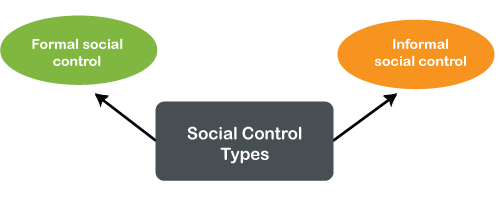Different Types of Social Control

Social control can be categorized into different types based on the nature and means of enforcement. These types are broadly divided into formal and informal social control.
Formal Social Control
Formal social control involves established and codified systems designed to enforce compliance with laws and regulations. These systems are typically institutionalized and include specific procedures and agents responsible for maintaining order.
-
Legal Systems:
- Laws and Regulations: Written rules that govern behavior, enforced by the state.
- Judicial Systems: Courts and judges that interpret and apply the law.
- Law Enforcement Agencies: Police and other authorities tasked with ensuring compliance with laws and apprehending violators.
-
Bureaucratic Control:
- Organizations and Institutions: Entities such as schools, workplaces, and government bodies that have rules and policies to regulate behavior.
- Administrative Procedures: Formal guidelines and processes for managing conduct within organizations.
-
Correctional Systems:
- Prisons and Detention Centers: Facilities for incarcerating individuals who violate laws.
- Probation and Parole Systems: Programs that supervise offenders outside of incarceration with specific conditions.
Informal Social Control
Informal social control is exerted through social interactions and cultural norms without official codification. It relies on socialization, peer pressure, and community influence to guide behavior.
-
Socialization:
- Family: Primary socialization agents who instill norms and values from early childhood.
- Education: Schools and teachers who transmit societal norms and expectations.
-
Cultural Norms:
- Traditions and Customs: Long-standing practices that guide acceptable behavior.
- Beliefs and Values: Shared understandings of what is right and wrong within a culture.
-
Peer Pressure and Community Influence:
- Social Groups: Friends, colleagues, and peer networks that influence behavior through expectations and acceptance.
- Public Opinion: Collective approval or disapproval expressed by the community.
-
Social Sanctions:
- Positive Sanctions: Rewards and recognition for conforming behavior, such as praise or awards.
- Negative Sanctions: Punishments and disapproval for deviant behavior, such as ridicule, gossip, or ostracism.
-
Rituals and Ceremonies:
- Rites of Passage: Events and rituals that reinforce community values and norms.
- Celebrations: Community gatherings that reinforce shared values and social cohesion.
Theoretical Perspectives on Social Control
-
Functionalism:
- Sees social control as essential for maintaining societal stability and order.
- Norms and laws are considered necessary for the functioning of society.
-
Conflict Theory:
- Views social control as a tool used by dominant groups to maintain power and suppress subordinate groups.
- Emphasizes the role of social control in perpetuating inequality.
-
Symbolic Interactionism:
- Focuses on the everyday interactions and meanings individuals attach to social control mechanisms.
- Examines how individuals perceive and respond to social control in their daily lives.
In summary, social control is a complex system encompassing both formal and informal methods to ensure societal order and compliance with norms and laws. These mechanisms work together to regulate individual and group behavior, promoting stability and cohesion within a society.
Thank you,
